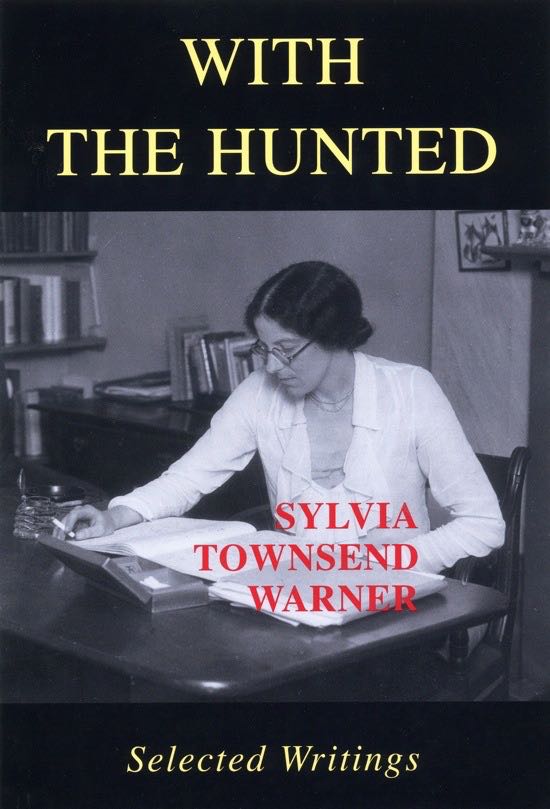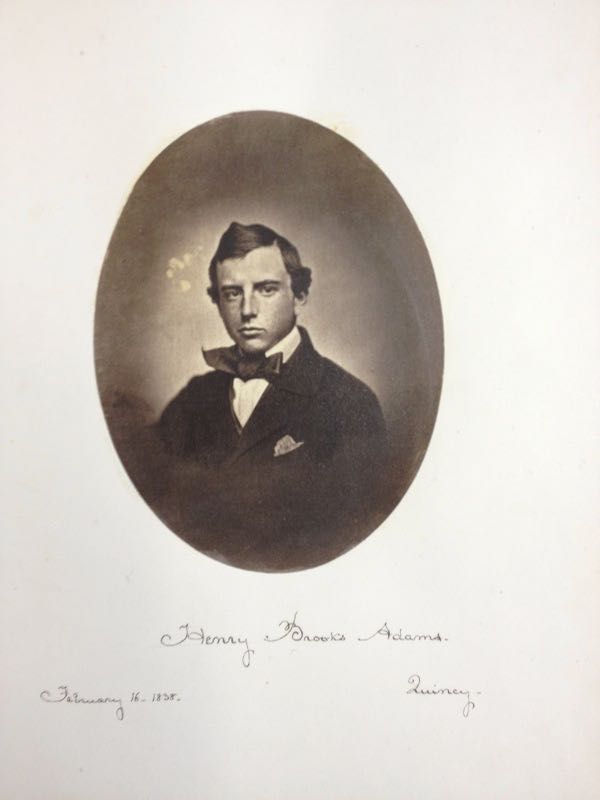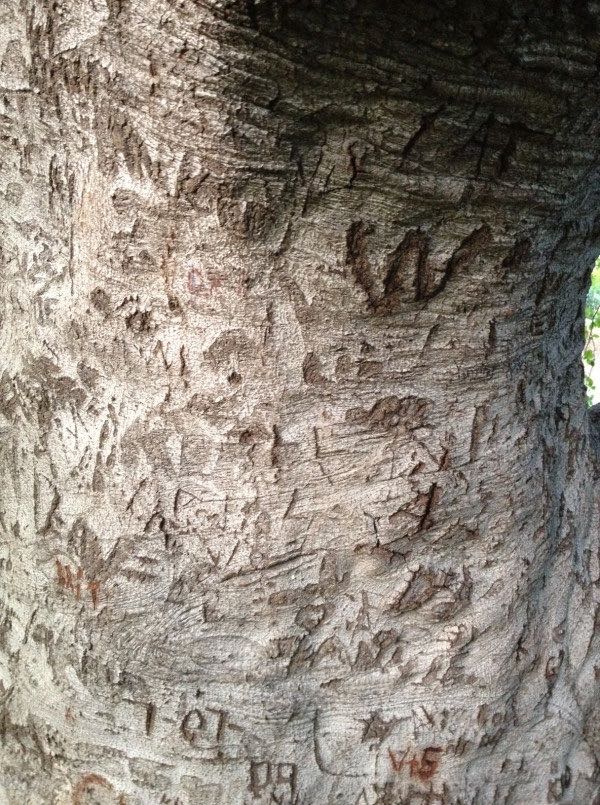
October - December 2012

6 December 2012
That Time of Year : Best Book of 2012
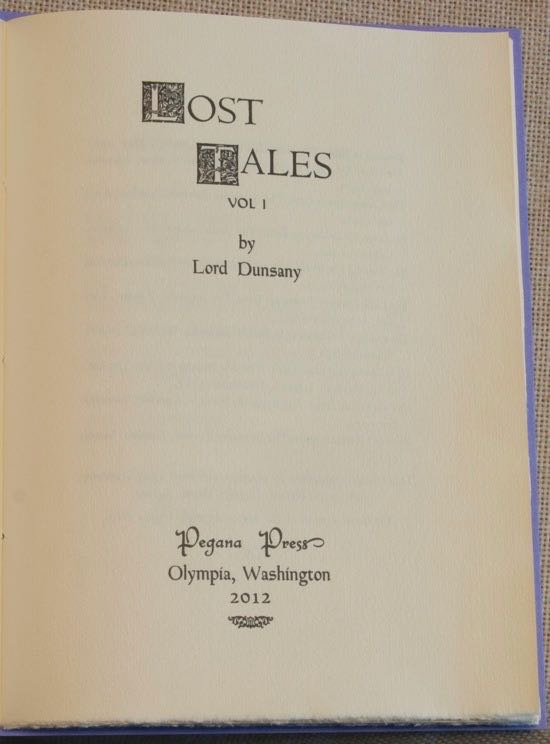
— Lord Dunsany. Lost Tales. Vol I [Introduction by Michael Swanwick]. Text printed letterpress from Centaur and Goudy types on Hahnemühle paper, with ornamental initials. 29 pp. Pegana Press, 2012. Edition of 128 copies, stitched in lavender wrappers. Previously uncollected stories and vignettes by Dunsany, from early in his career, assembled in a finely printed edition by Mike Tortorello. On grounds of form (beauty), content, and the way this book justifies its existence — by collecting material that had never previously been reprinted — hands down the best book of 2012. notice here
older books (read or re-read in 2012)
— Eleanor Arnason. Mammoths of the Great Plains. Plus Writing
Science Fiction during World War Three. And “ At the Edge of the Future ” Outspoken
Interview. PM Press, 2010. notice below
— Stephen Hebron and Elizabeth C. Denlinger. Shelley’s Ghost.
Reshaping the Image of a Literary Family. Bodleian Library, [2010].
— Amos Tutuola. The Palm-Wine Drinkard and his dead Palm-Wine
Tapster in the Deads’ Town. Faber and Faber, [1952].
— Peter Dickinson. The Green Gene. Pantheon, [1973] notice here
— Keith Roberts. Pavane. 1969 ; Old Earth Books, [2011].
highlights of 2012 : seven books
— The Cambridge Companion to Fantasy Literature. Edited by
Edward James & Farah Mendlesohn. Cambridge University Press, 2012. The Greer
Gilman essay alone is worth the price of admission.
— Elizabeth Hand. Available Dark. Minotaur Books, [2012].
— Matt Ruff. The Mirage. Harper, [2012].
— Robert Sheckley. Store of the Worlds. The Stories of Robert Sheckley.
Edited and with an introduction by Alex Abramovich and Jonathan Lethem. NYRB
Classics, [2012].
— Robin Sloan. Mr. Penumbra’s 24-Hour Bookstore. Farrar, Straus and
Giroux [2012]. review here
— Mark Valentine & John Howard. Secret Europe. Bucharest : Exposition
Internationale, 2012. Literary gazetteer of lost and unexplored places of Europe.
— Sylvia Townsend Warner. With the Hunted. ed. Peter Tolhurst. Black
Dog Books, [2012]. see below
— — — —
Forthcoming from Temporary Culture
Temporary Culture
is pleased to announce the forthcoming publication of
AGAINST THE ART OF WAR
by Ernest Hilbert and Henry Wessells
with etchings by Judith Clute
To be published on 15 February 2013 in San Francisco, London, and Upper Montclair.
Two original poems by Ernest Hilbert and Henry Wessells with three aquatint
etchings printed by the artist.
7 x 10 inches, 16 pp., letterpress printed by David Wolfe of Portland, Maine,
hand bound in paste paper boards.
Edition of 26 lettered copies, signed by the authors and the artist.
Price to subscribers before publication : $375.00
Payment by cheque or money order in U.S. funds, or by credit card. NO Paypal.
Sample pages will be made available to prospective subscribers in late December.
Five numbered copies are reserved for the artist, authors, and printer.
http://avramdavidson.org/Againsttheartofwar.html
Orders and inquiries to:
Temporary Culture
P.O. Box 43072
Upper Montclair, NJ 07043
electronym : wessells [at] panix [dot] com
Ernest Hilbert is the author of two collections, Sixty Sonnets (2009)
and All of You on the Good Earth (forthcoming in March, 2013). He
lives in Philadelphia.
Henry Wessells is author of Another green world (2003) and compiler
of the Endless Bookshelf. He lives in Montclair, New Jersey.
Judith Clute is a Canadian artist resident in London. In 2008, Temporary
Culture published her etchings to Forever
Peace. To Stop War by Joe Haldeman. She has recently exhibited work
in Prague and her website is http://www.judithclute.co.uk/ .
— — — —
— Sylvia Townsend Warner. With the Hunted. ed. Peter Tolhurst. Black Dog Books, [2012]. Excellent and wide ranging collection of essays and reviews and miscellaneous pieces spanning the full career of Sylvia Townsend Warner, author of Lolly Willowes and many others. She writes exceedingly well of village life, and her essay on Women as Writers is great. The notes are curious, at times very detailed, while at other times omitting key details that place the essay in time and context. As in, for example, the undated essay “ A Class Distinction ”, very plainly about the Diaries of A.J. Munby, published in 1972 (and recently mined to good effect by Diane Atkinson for Love & Dirt. The Marriage of Arthur Munby & Hannah Culwick, 2003). I will be looking for Warner’s late collection of stories, Kingdoms of Elphin. I obtained my copy of With the Hunted through Bow Windows Book Shop in Lewes, Sussex.
— — — —
The Wailing of the Gaulish Dead
The Avram Davidson Society
and the Nutmeg Point District Mail
are pleased to announce the forthcoming publication of
THE WAILING OF THE GAULISH DEAD
by AVRAM DAVIDSON
To be published by the Nutmeg Point District Mail on 8 May 2013 in New York
and Upper Montclair, to mark the twentieth anniversary of the death of Avram
Davidson. Publications of the Avram Davidson Society, number four.
Original previously unpublished Adventure in Unhistory by Avram Davidson,
composed in November 1981.
The editor would like to thank Grania Davis and the Owlswick Literary Agency;
and to thank Iain Odlin for preserving the typescript (please make your present
whereabouts known to the editor).
Edition of 200 copies, printed offset and perfect bound in heavy card covers,
french flaps.
6 x 9 inches, 48 pp.
Price to subscribers before publication : $20.00
For orders received before 15 April 2013, the price includes postage in U.S.A.
Payment by cheque or money order in U.S. funds, or by credit card. NO Paypal.
Ten numbered and specially bound copies will be reserved for presentation.
The Nutmeg Point District Mail is an imprint of Temporary Culture.
http://avramdavidson.org/Wailing.html
Orders and payment to :
Henry Wessells
P.O. Box 43072
Upper Montclair, NJ 07043
electronym : wessells [at] panix [dot] com
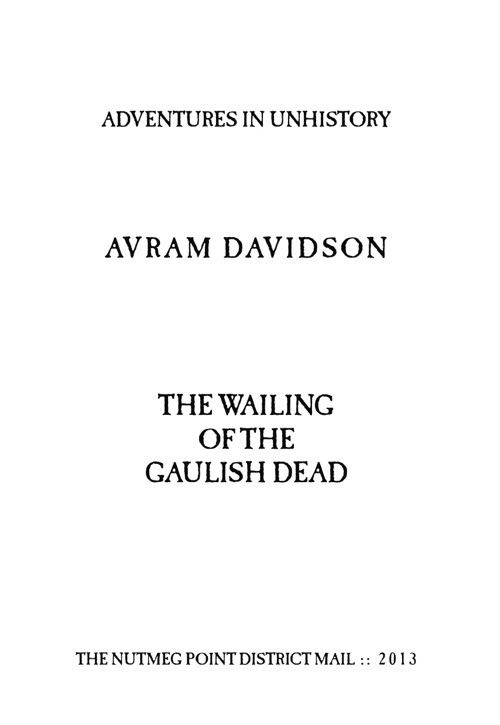
— — — —
recent reading
“ How hard to get them to leave the pavement and go for
a stroll in the jungle ! ”
—
Robert Eldridge. When Books Kaleidoscope or The Catalogue That
Time Forgot. In Remembrance of Stuart Teitler (1940-2012). Elizabethtown,
N.Y. : Gloomhaven Press, 2012. Edition of 32 copies. Short memoir
of antiquarian book scout and Lost Race collector Stuart Teitler (whom
I knew only through the Serendipity catalogue of his collection of Lost Race novels) — “ He
dreamed of finding something he’d never heard of, something wonderful . . . . This
vision was expressed in his axiomatic advice for scouts : don’t
look for books, look at them. ” With a superb catalogue
of imaginary books, including, notably Tarzan at the Gates of Oz by
ERB, and Henry James, My Life Beating around the Bush of Ghosts (1992).
— — — —
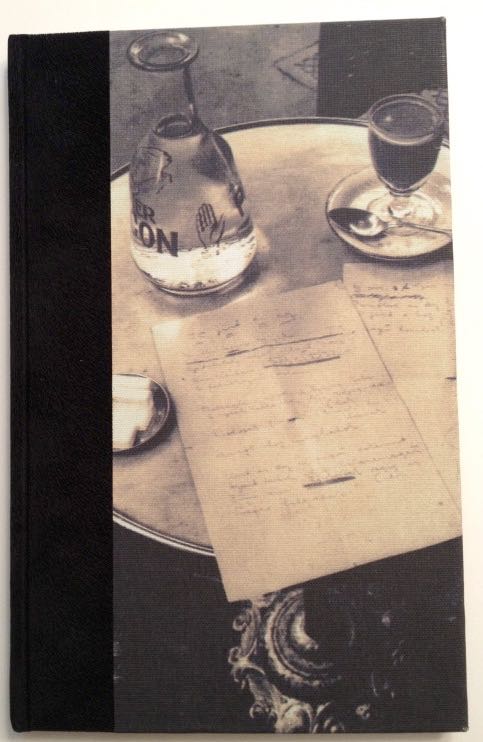
— — — —
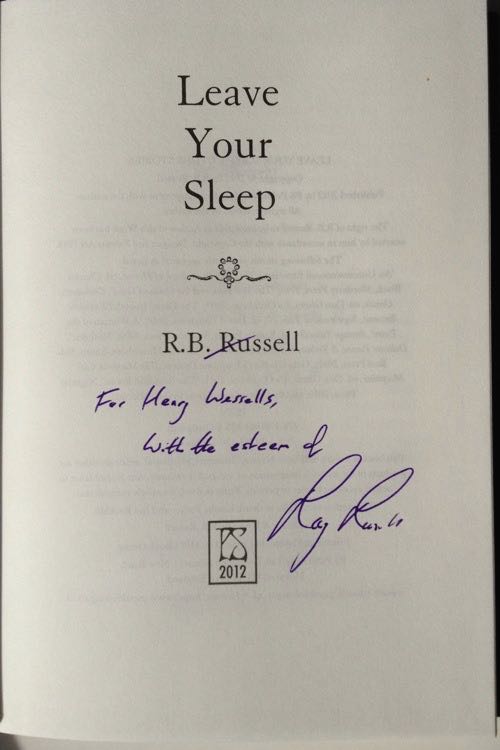
— R.B. Russell. Leave Your Sleep. PS, 2012. Collection of a dozen stories, five original to this collection.
— — — —
— William Charlton. Canapés for the Daughter of Chaos. Les Éditions de l’Oubli Bucharest 1945, [2012]. Collection of five stories.
— Michael Connelly. The Black Box. A Novel. Little Brown, [2012].
— Andrew Garcia. Tough Trip through Paradise 1878-1879. Edited by Bennett H. Stein. 1967 ; University of Idaho Press pbk., third printing, [2003]
— — — —
seen in Boston : Henry Brooks Adams, Harvard class of 1858 / file under : Education
— — — —
— — — —
31 October - 1 November 2012
Mammoths of the Great Plains
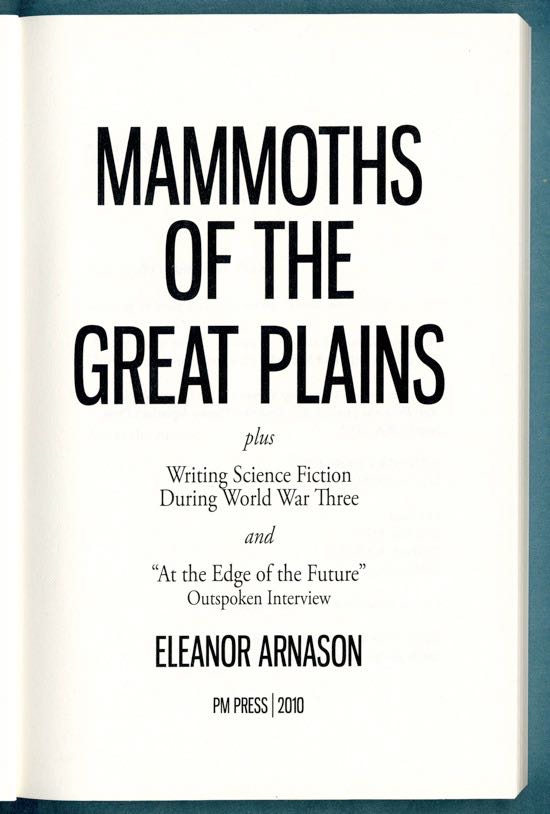
— Eleanor Arnason. Mammoths of the Great Plains. Plus Writing Science Fiction during World War Three. And “ At the Edge of the Future ” Outspoken Interview. PM Press, 2010. Wow, a told tale that deftly, quietly rewrites the history of north America ; a compelling voice, irresistible and inseparable from the tale being told.This is simply brilliant, accomplishing vast things within a short space. [Thanks, Greg F.]
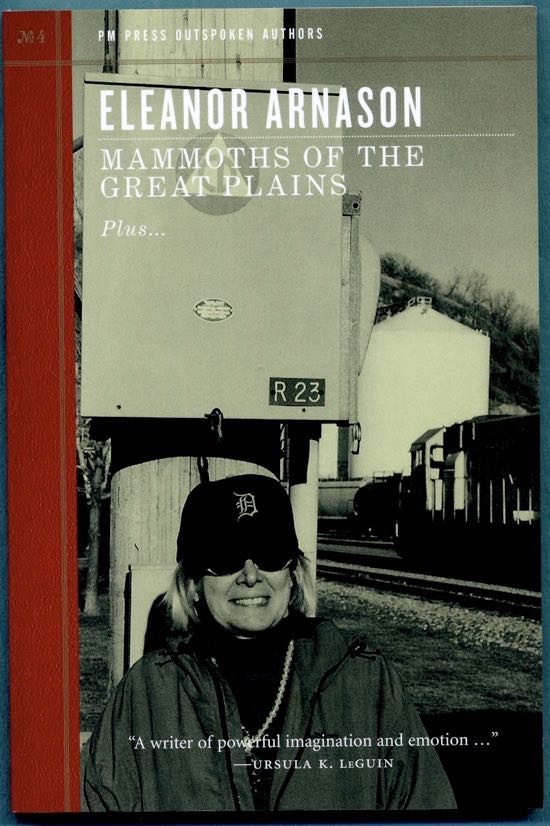
— — — —
The gardener hath gathered up this autumn’s leaves. Who shall see them again . . . ?
— Dunsany, The Fortress Unvanquishable, Save for Sacnoth
— — — —
current reading :
— Andrew Garcia. Tough Trip through Paradise 1878-1879. [Houghton Mifflin, 1967] Universty of Idaho Press paperback, [2002].
recent reading :
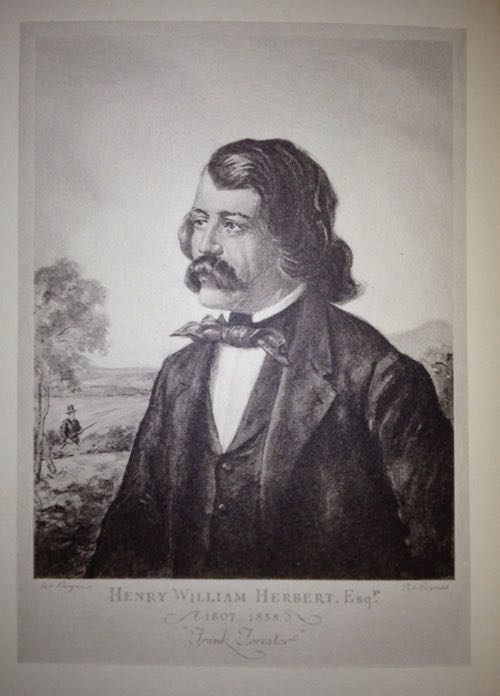
— William Southworth Hunt. Frank Forester.[Henry William Herbert]. A Tragdy in Exile. Carteret Book Club, 1933. Life of Henry William Herbert (1807-1858), English remittance-man (grandson of an earl), classically educated (Rottingdean, Eton, and Cambridge), prolific writer, and an outdoorsman whose writings as Frank Forester transcend his hack origins and mark him as the first professional writer on sporting subjects.
— Bernard Lewis with Buntzie Ellis Churchill. Notes on a Century. Reflections of a Middle East Historian. Viking, [2012]. Formal, pleasantly digressive (but rather evasive) memoirs of a great scholar (my old prof).
— Robert Silverberg. Dying Inside. Scribners, [1972].
— Donna Leon. Beastly Things. Atlantic Monthly
Press, [2012].
— —— A Question of Belief. Atlantic Monthly
Press, [2010].
— Leela Corman. Unterzakhn. Schocken Books, [2012]. Rich, deft, expressionist tale of two sisters on the old Lower East Side.
— Bill Pronzini. Hellbox. A Nameless Detective Novel. Forge, [2012]. Well-paced as always, uncharacteristically meager plot.
— Dennis Lehane. Gone, Baby, Gone. A Novel (1998). The narrative held too much explanatory prose for your correspondent’s tastes (violation of Marianne Moore’s Law).
— S. T. Joshi. I Am Providence. The Life and Times of H. P. Lovecraft. 2 vols., Hippocampus Press, [2010]. Inscribed by the author in each volume. I had read and reviewed Joshi’s earlier biography, H. P. Lovecraft. A Life (Necronomicon Press, 1996), and when he made a rare visit to New York, I came to say hello and have these volumes signed. I also brought along a critical fiction H.P. Lovecraft, Bbliopole, composed for the occasion (this will appear in a future issue of the New York Review of Science Fiction). I Am Providence is a comprehensive biography (that includes material omitted from the 1996 edition), so dipping into it is visiting with an old friend. I read the final chapters with special interest, the account of Lovecraft’s last years, and to see Joshi’s updated assessment of the posthumous career.
re-readings :
Books I re-read in mid-October included :
— Thomas Pynchon. The Crying of Lot 49
— Nat Segnit. Pub Walks in Underhill Country
— John Buchan. John Macnab
— — — —
This Bookshelf Game
October has certainly been Max Fenton Month.
1 : Lovecraft or Heinlein ? In conversation at the New York launch party for Mr. Penumbra's 24-hour Bookstore, when I asked, Are you a Lovecraftian ? , Max responded, No, I read Heinlein when I was fourteen. This identifies an interesting, and distinctly American pair of divergences in the garden of forking paths. I know there will be some readers who read both authors, but your correspondent invites readers to send in their answers to this question.
2 : The Bookshelf Game. I credit Max Fenton with putting into words what it is we are all doing — by which I mean the exchange of literary texts for non-commercial motives of friendship, literary communication, and love of books : “ playing this Bookshelf Game ”.
When I say we, I mean this in the broadest sense of the word. In a mid-nineteenth century mariner’s diary now at the Providence Public Library, Henry DeForrest reports on his reading, and how “ the reading part of the crew ” would exchange books when they speak other whalers. The erratic and tyrannical captain of the ship was contemptuous of reading : “ The Captain sets here damning books and reading, I understand him perfectly, but care as much as I would for any old dog barking ” (11 January 1853). Not three weeks later, however, DeForrest writes, “ The old man has taken to reading, he is now perusing Uncle Tom’s Cabin, he says he likes it because it is a nigger yarn ” (6 February 1853). As Uncle Tom’s Cabin was published after the William Rotch sailed, DeForrest can only have obtained it during one of these exchanges of books off the coast of Peru.
I play this Bookshelf Game to lose : to shed & scatter & give away. Curious how it is personal favorites and truly significant books that I give away most often. (I have already given away the first copies of Mammoths of the Great Plains that I bought, and have ordered more.)
Readers will have their own versions of the Bookshelf Game : it is a very long tradition.
— — — —
to convert a series into a whole

— Dispatches from the Ship Spotter Club. [Cover title :] The Ship Spotter Club. Dread Accursed Primer Vol. 1. 435, [7] pp. [Privately printed for Whale & Crown, 2011]. This book is a conversation among friends, a fascinating commonplace book of source materials, fragements, allusions made concrete, and private jokes. It is not a published book, for as its editor makes plain in the foreword, “ this is an illegal book. Proceed with caution. ” Jack Spicer (“ The grand concord of what | Does not. ”), video games, Robin Sloan on farmers markets, Raymond Chandler (“ neither tarnished nor afraid ”), “ Everything here is the best. ”, “ Athena in Death ” by Zachary Mason. THIS. ALWAYS THIS.
At the head of Chapter Eight is a passage cited from Coleridge:
The common end of all narrative, nay of all Poems is to convert a series into a whole.
Reader, the Primer does in printed form what the Endless Bookshelf has been doing serially : to gather a wide range of authors, influences, and elements into a whole.
In the seventeenth century, long after the establishment of print, collections of poetry and other works continued to be circulated in manuscript form for private use. In the nineteenth and early twentieth centuries, writers sometimes used print shops to set a manuscript in type and print a few copies for personal use — to cite three examples, Dickens had printed the version of David Copperfield he performed at public readings ; D.G. Rossetti had a few copies of a collection of his verse produced before its formal publication ; and T.E. Lawrence had a newpaper printer in Oxford print a handful of copies of the text of Seven Pillars (he gave discrete pieces to them, out of order, for his own purposes). Why should one not use available technologies to produce a private compilation of useful works. The Primer demonstrates the transformative nature of the assembly of carefully chosen citations and extended passages. I borrowed this copy of the Primer from friends to whom it had be lent by its original recipient ; having eaten the cake, I will return the book. Thank you.
Once printed and bound, a book escapes from control of author or editor ; its own history is formed singly (by individuals reading) and collectively (by their responses to the book). The Primer is an interesting experiment. I am sure that we will see more of this project.
— — — —
A title page vignette

The short essay that was to accompany this vignette (much enlarged), is delayed because I separated from a necessary reference source ; to be remedied shortly.
What is the significane of this portrait ? Free books for all who send inventive answers before 6 November.
— — — —
This update to the Endless Bookshelf comes from the Los Angeles area. Your correspondent has been staying with friends while awaiting the re-opening of Newark airport after the hurricane.
The new issue of Wormwood, edited by Mark L. Valentine, will soon be available from Tartarus Press. It includes Standing in the Shadows of ‘ Lud ’: A Selective Discussion of Interesting Fantastical Novels of the Immediate Aftermath of the First World War, adapted from my talk at Readercon in July 2011.
Two recent quotations from Norman Davies interviewed by the Financial Times over lunch in Poland : “ All political institutions will end sooner or later. The question is when and how. ” And :
History is like an avalanche. The starting point is a snow-covered mountainside that looks solid. All the changes take place under the surface & are rather invisible. But something is coming. What is impossible is to say when.
Mrs Midnight and Other Stories by Reggie Oliver (Tartarus, 2011), the Endless Bookshelf book of the year is a World Fantasy Award nominee. The World Fantasy Convention will take place in Toronto next weekend.
Mark Twain & Me
A short note about recent research trip to the Princeton University Library
on the Rare Books blog :
http://blogs.princeton.edu/rarebooks/2012/10/new_information_about_an_editi.html
I will post a longer piece about the research when I am back in New Jersey.
In mid-November, I will be in Boston for the Boston Antiquarian Book Fair. James Cummins Bookseller will be exhbiting in booth 410. Come say hello (and if you require a ticket, please let me know in advance).
Buch = Beech = Book
— — — —
This creaking and constantly evolving website of the endless bookshelf : I expect that some entries will be brief, others will take the form of more elaborate essays, and eventually I will become adept at incorporating comments or interactivity. Right now you’ll have to send links to me, dear readers. [HWW]
electronym : wessells
at aol dot com
Copyright © 2007-2012
Henry
Wessells and individual contributors.
Produced by Temporary
Culture, P.O.B. 43072, Upper Montclair, NJ 07043 USA.
